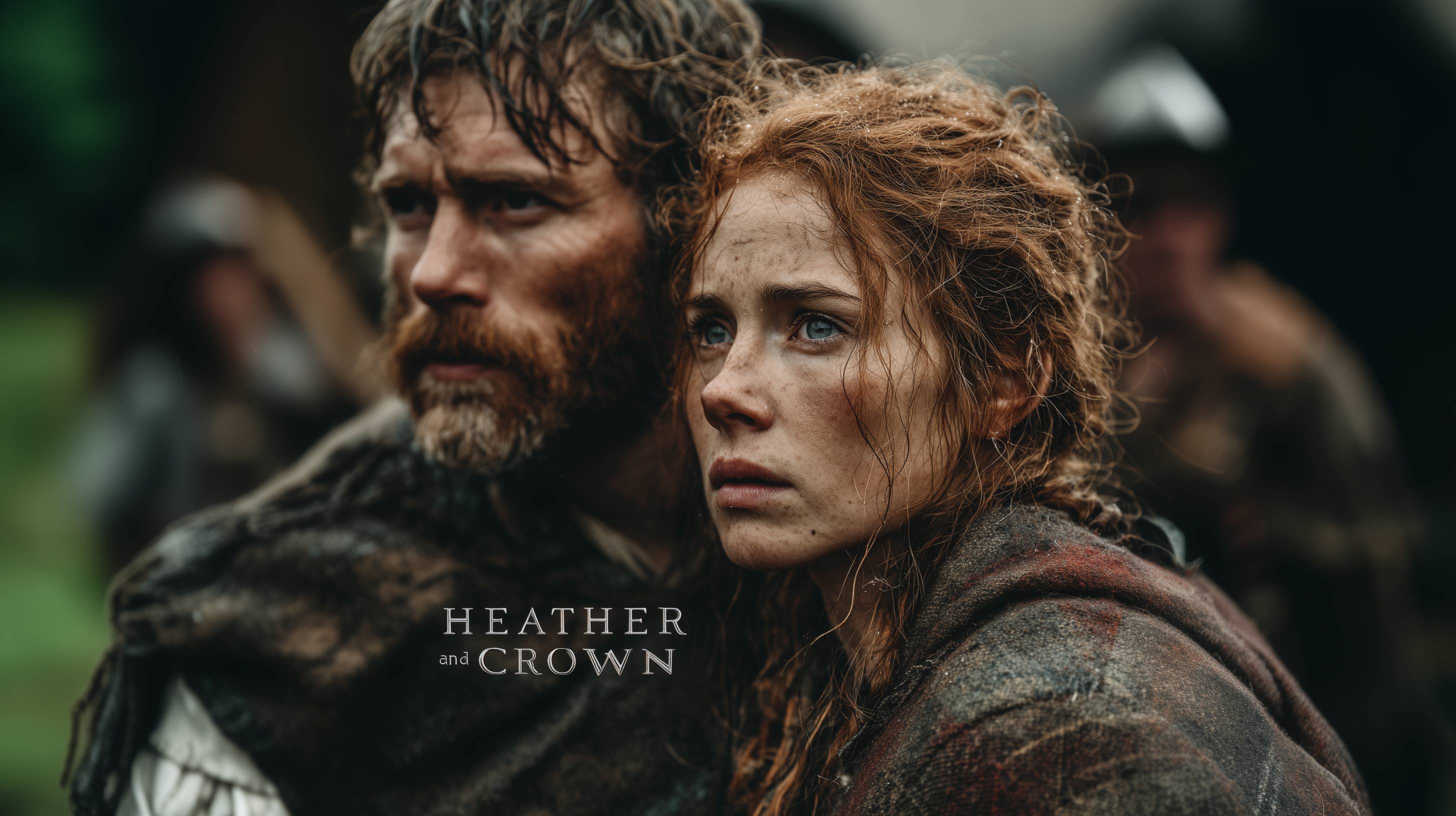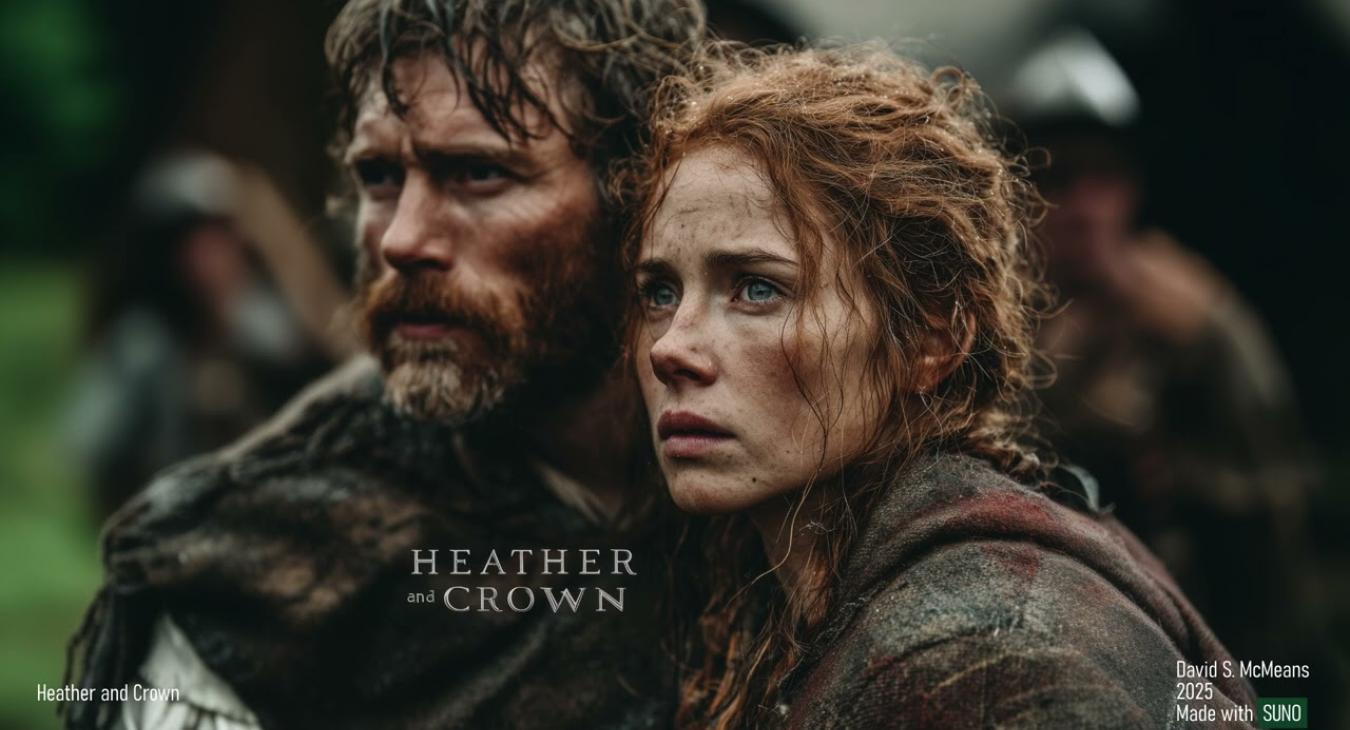A haunting Scottish ballad of love and loss that rises into a cry of remembrance and resistance against the erasure of a people’s soul.
“The Heather and the Crown” is a historical ballad set in Scotland during the turbulent centuries of English rule and internal upheaval. It recounts the struggles of a Scottish couple whose love is shaped and scarred by the political, economic, and cultural forces that beset their homeland. The song references major historical events such as the Acts of Union (1707), the Jacobite risings (notably the Battle of Culloden in 1746), the Highland Clearances of the 18th and 19th centuries, and the suppression of Gaelic language and culture. It mourns the human cost of imperial policy, religious division, economic displacement, and cultural erosion, while ending with a call to remembrance, cultural resilience, and quiet defiance — a uniquely Scottish form of endurance that honors the dead and keeps the identity of a people alive through song, land, and legacy.
Why This History Matters
"The Heather and the Crown": The Song of a People Who Would Not Disappear
In an age of instant communication and global culture, it's easy to forget that identity was once a matter of survival. “The Heather and the Crown” reminds us that Scotland’s history is not just kilts and castles — it’s the deep wound of cultural displacement, economic betrayal, and suppressed voices that still echo in the land.
This ballad is a poetic entry into the very real stories of the Highland Clearances, where families were evicted from ancestral lands to make room for sheep and profit. It walks through the trauma of Culloden, where the Jacobite dream of Scottish sovereignty was crushed under British boots, and it sings of a language — Gaelic — that was nearly lost, not by accident, but by policy.
But more than mourning, the song does something powerful: it remembers. It refuses to forget the names of the dead, the grief of the women, the rage of the warriors, and the strength of the old songs. And in a time when history is often flattened into entertainment or statistics, remembrance is itself resistance.
Why does this history matter? Because it’s not just about Scotland — it's about what happens when a culture is told to disappear. It's a warning against the seduction of empire, the cost of silent complicity, and the loss of the local in a world obsessed with the global.
But even more, it’s a promise: that the soul of a people may bend, but it will not break. That the heather still blooms, even under centuries of ash. That memory, song, and love of place are not quaint relics, but weapons of survival.
We should know this history — because our own might be next.
While the Highland Clearances were a time of deep tragedy and loss, they also gave rise (ironically and poignantly) to a Scottish diaspora that deeply influenced other parts of the world. Many families forcibly displaced from their lands emigrated to North America, Australia, and elsewhere. Though they left under duress, their descendants often rose to significant historical roles abroad.
Here are notable examples of individuals or families affected by the Clearances or their direct consequences who went on to leave a lasting mark in other places:
1. Alexander Mackenzie (1764–1820)
Role: Explorer and fur trader; first European to cross North America north of Mexico.
Clearances Connection:
Born in Stornoway on the Isle of Lewis (Outer Hebrides), where the Clearances struck harshly. His family emigrated to Canada in 1774 due to economic pressures and instability linked to the early waves of Highland displacement. Mackenzie would become a pivotal figure in the fur trade and mapmaking of Canada.
Legacy:
His 1793 expedition to the Pacific predates Lewis and Clark by over a decade. The Mackenzie River, Canada’s longest, is named after him.
2. Sir John A. Macdonald (1815–1891)
Role: First Prime Minister of Canada.
Clearances Connection:
Macdonald was born in Glasgow to a Highland family that emigrated during a period of intense rural hardship in the early 19th century. While not directly evicted, his family's departure was part of the broader wave of economic dislocation that defined the Clearances.
Legacy:
Though a controversial figure today (especially regarding Indigenous policy), Macdonald was instrumental in the confederation of Canada and the shaping of its early institutions.
3. Flora MacDonald (1722–1790)
Role: Heroine of the Jacobite cause; helped Bonnie Prince Charlie escape after Culloden.
Clearances Connection:
After her role in aiding the Prince, she was imprisoned, eventually emigrated to North Carolina (1750s) amid growing pressure on Highland Jacobites, and became part of the Highland diaspora.
Legacy:
She was honored in both Scotland and the U.S., representing the loyalty and endurance of Highland culture even in exile.
4. Reverend Norman McLeod (1780–1866)
Role: Presbyterian minister and leader of a large Scottish emigrant community.
Clearances Connection:
Born in Assynt (Sutherland), a region heavily cleared in the early 19th century. Disillusioned by both economic pressures and religious oppression, he led a group of Highlanders first to Nova Scotia and later to New Zealand.
Legacy:
His group settled in Waipu, New Zealand, creating a lasting Gaelic-speaking community. McLeod was a fiery and controversial figure, but his migration effort preserved Highland customs in the Pacific.
5. Donald McDonald and the Settlers of Glengarry, Ontario
Role: Founders of one of Canada’s most important Highland Scottish settlements.
Clearances Connection:
Evicted from the lands of Clan MacDonell in Inverness-shire (Glengarry) in the late 18th and early 19th century, hundreds emigrated en masse. They were led in part by Alexander Macdonell (later first Catholic bishop of Ontario).
Legacy:
The Glengarry Highland Games today celebrate this legacy; the settlers also played key roles in Canada's military, religious, and political history.
6. US Political Figures
🇺🇸 Andrew Jackson (1767–1845)
7th President of the United States
- Ancestry: Parents were Ulster Scots (Scots-Irish) from Carrickfergus, but the family originally hailed from the Scottish Lowlands and border regions — driven to Ulster during earlier periods of land pressure and religious discrimination.
- Clearances Link: Not directly evicted during the Clearances, but his family history reflects the longer arc of Scottish displacement and rural hardship that eventually spilled into Irish and colonial migrations.
- Legacy: Known for populist appeal and frontier toughness — traits sometimes attributed to his Scots Presbyterian upbringing.
🇺🇸 James Monroe (1758–1831)
5th President of the United States
- Ancestry: Scottish Highland and Lowland descent; his family migrated during the early wave of Highland depopulation and political tension following the Jacobite uprisings.
- Clearances Link: His ancestors likely left due to the precursors of the Clearances (economic dislocation and anti-Highland policies).
- Legacy: Oversaw the “Era of Good Feelings” and the Monroe Doctrine.
🇺🇸 Woodrow Wilson (1856–1924)
28th President of the United States
- Ancestry: Both parents were of Scottish and Scots-Irish descent. His maternal grandfather, Rev. Thomas Woodrow, was a Presbyterian minister from Paisley, Scotland.
- Clearances Link: The Woodrow family likely left Scotland due to the shrinking opportunities and ecclesiastical tensions in the wake of Clearances-era policies and the Disruption of the Kirk (1843).
- Legacy: Idealist reformer and internationalist; influenced by his Calvinist heritage.
🇺🇸 Ronald Reagan (1911–2004)
40th President of the United States
- Ancestry: His maternal family (Clyde and Wilson) were of Scottish descent, with links to the Ayrshire region and the Highland line.
- Clearances Link: While not definitively connected to a specific clearance, the Clyde family likely emigrated due to the wider displacement trends in the 19th century.
- Legacy: Emphasized individual freedom, anti-communism, and a kind of frontier optimism rooted in Scots-Irish Presbyterian values.
🇺🇸 Jeff Sessions (b. 1946)
Former U.S. Senator and Attorney General
- Ancestry: Direct descendant of Highland Scots; the Sessions family is traceable to 18th-century Scottish emigrants who arrived during the post-Clearance diaspora.
- Clearances Link: Likely part of families affected by the late 1700s–early 1800s Clearances, especially in northern Scotland.
- Legacy: Known for a hardline approach to immigration — ironically at odds with his own family’s displacement history.
🇺🇸 Douglas MacArthur (1880–1964)
General of the Army, WWII and Korean War
- Ancestry: Scottish Highland ancestry on his mother’s side, the Hardy family.
- Clearances Link: Family records suggest Highlander roots, with emigration during the early 19th century Clearances period.
- Legacy: Embodied military resilience and American expansionism; often cited his Presbyterian discipline and Highland roots.
The Clearances were intended to "erase" a way of life, but the emigrants and their children transformed their grief into influence. Their contributions abroad — whether in nation-building, exploration, or cultural preservation — testify to the resilience of the Scottish spirit and raise difficult questions about forced migration, cultural survival, and empire.
The ballad "The Heather and the Crown" reflects this very tension: loss that blossoms into legacy — and the fire that carries across oceans.
“The God Who Sees the Dispossessed”
A Devotional Reflection in the Spirit of Tim Keller on the Highland Clearances, Injustice, and the Christian Response to Revenge
“You intended to harm me, but God intended it for good—to accomplish what is now being done, the saving of many lives.”
— Genesis 50:20
1. The Wound That Still Bleeds
Some tragedies seem too large to speak of, and yet too important to forget. The Highland Clearances are one such wound. They were not merely economic policy or agricultural modernization — they were a slow, methodical removal of a people from their land, their language, and their way of life. Entire communities were displaced from glens and isles where their ancestors had lived for centuries. The thistle was trampled beneath the hoof of empire.
Families were evicted in the name of profit. Churches were silenced. The Gaelic tongue was mocked and forbidden. And all of it was legal.
The question presses in: Where is God in all this? How does a Christian respond — not only to the historical fact of injustice, but to the real temptation to retaliate, to hate, to live with bitterness?
Let us walk slowly through this, as Scripture does — beginning not with answers, but with lament.
2. The Bible Never Dismisses Injustice
God does not minimize what happened in Scotland — or anywhere else where the vulnerable are crushed. He never asks us to look away or move on. On the contrary, Scripture is filled with God’s own lament over injustice.
He sees Hagar in the wilderness. He hears the blood of Abel crying from the ground. He warns through the prophets that judgment is coming upon those who “trample the heads of the poor into the dust of the earth” (Amos 2:7). And Jesus Himself opens His public ministry with a proclamation of good news to the poor, liberty for captives, and freedom for the oppressed (Luke 4:18).
We must therefore name the Clearances for what they were: an abuse of power, a violation of neighbor-love, and a failure of economic justice. The gospel does not allow us to cover over these realities. We must mourn the lost homes, the broken families, the buried children.
3. The Lure of Revenge and the Call to Justice
But when we've named the injustice — what then?
We naturally want revenge. There’s something almost righteous about it. The desire to make the powerful feel what they made others feel. To balance the scale by force. And if we’re honest, the poetry of retribution sings to our soul.
But Scripture makes an urgent distinction between revenge and justice.
In Romans 12:19, Paul says, “Do not take revenge, my dear friends, but leave room for God's wrath, for it is written: ‘It is mine to avenge; I will repay,’ says the Lord.”
This is not a call to passive acceptance. It’s a call to hand justice over to the only One who can wield it without becoming evil Himself. If we take vengeance into our hands, it changes us. We become the very thing we hate. As Nietzsche famously warned, "Beware that, when fighting monsters, you yourself do not become a monster."
Tim Keller often emphasized that the gospel is the only power strong enough to break the cycle of retaliation. In Christ, God took the penalty of sin — including the sins of injustice and violence — into Himself. The cross is not the denial of justice, but the assurance that it will not be escaped. Either we leave judgment to the cross, or we try to enact it ourselves — and it destroys us.
Forgiveness, then, is not letting injustice go. It is entrusting it to God, who sees all and will judge rightly.
4. Redemption Does Not Mean Denial
The temptation after naming injustice and surrendering revenge is to quickly search for a silver lining — to say, “Well, at least something good came out of it.”
But that is not the biblical order.
Before redemption comes lament. The Psalms give us the language of sorrow: “My tears have been my food day and night” (Psalm 42:3). God Himself, through Christ, weeps at Lazarus’s tomb before He raises him. We must not minimize what was lost in the Clearances. The songs, the land-based identity, the sense of belonging — all deeply human and deeply biblical goods.
And yet — slowly — we see resurrection patterns emerge.
Displaced Highlanders brought their faith to the edges of the earth. Their descendants planted churches in Nova Scotia, preached the gospel in the Carolinas, helped build just societies in Canada, New Zealand, and beyond. What man meant for evil, God, in His sovereign mercy, wove into global blessing.
This does not justify the Clearances. But it testifies to the God who brings beauty from ashes (Isaiah 61:3). A God who does not waste pain.
5. What the Gospel Calls Us to Do
a. Remember
To forget is to lose part of our soul. The Bible is filled with genealogies, festivals, altars — all ways of remembering. Remember the stories of the people. Speak their names. Visit the stones. Sing the laments. The memory of the saints is a form of resistance.
b. Resist Injustice Today
The spirit of the Clearances is not dead. Wherever systems exploit the weak — in housing, in labor, in land — the people of God must speak. We are called not only to be generous individuals, but to seek structural justice (Micah 6:8). Don’t just feel bad about the past — act justly in the present.
c. Forgive — But Don't Forget
Forgiveness is not amnesia. It is a spiritual act of trust. We do not condone, excuse, or pretend. We acknowledge the cost, and we hand it to Christ. This frees us from the prison of bitterness and makes room for healing and hope.
d. Hope in the Resurrection
This is not a metaphor. One day, the cottages will be rebuilt. The lost lands restored. The dead will rise. Christ promises a new heavens and a new earth — not clouds and harps, but real hills, real songs, real homes. And He Himself was the first exile, driven outside the city gate, that we might be brought in.
6. In the End, a Home
Perhaps the deepest wound of the Clearances was not just economic — it was existential. People lost their home.
But in Christ, God has given us a home no power can take. Peter says we are “aliens and strangers” now (1 Peter 2:11), but soon we will be seated at a feast in our true country. The wandering ends. The injustice is undone. The exiles return.
And on that day, every hill will be restored, every accent heard again, and every tear accounted for.
So until then: Mourn. Remember. Forgive. Act. Hope.
God sees the dispossessed. And He is not finished.
“Blessed are those who mourn, for they shall be comforted.”
— Matthew 5:4
Read more articles
- Log in to post comments


